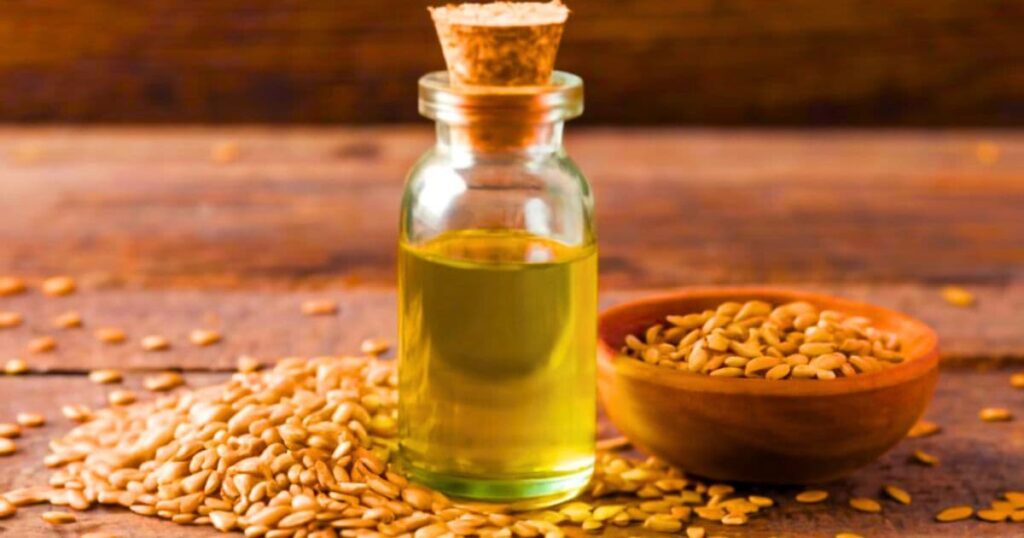Flaxseed a tiny seed is a modern day superfood
People all across the world who are worried about their health incorporate flaxseed in their meals because of its numerous acclaimed nutrients and prospective health benefits.
To be more exact, how does this small seed grow so potently? Explore the wonderful world of flaxseed with this all-inclusive book that looks into its nutritional profile, health benefits culinary applications, and even some startling facts.
Discover the secrets of this powerhouse seed, from its rich omega-3 fatty acids to its high fiber content. Learn how flaxseed can help lower cholesterol improve digestion, and even aid in weight loss.
With delicious recipes and helpful tips, you’ll be able to easily incorporate this superfood into your daily routine and reap all of its amazing benefits. Dive into the world of flaxseed and unlock its full potential for a healthier, happier you.
A historical seed
There is a long and distinguished history of flax Linum usitatissimum. The evidence points to Mesopotamia as the area of cultivation where the plant was highly prized for its oil rich seeds and textile fibers linen .
Flaxseed became an essential element of the diet of many different civilizations as it spread around the world. Today flax is a significant agricultural crop farmed for its seeds and fibers.
Flaxseed has gained popularity in recent years due to its numerous health benefits including being high in omega-3 fatty acids and fiber. The fibers from the flax plant are used to create linen textiles known for their durability and breathability.
With its rich history and continued importance in agriculture and industry flax remains a versatile and valuable crop in today’s global economy.
A Nutritional Powerhouse
They also provide a good source of fiber, which can aid in digestion and help with weight management. Additionally flaxseeds contain antioxidants that can help protect against chronic diseases such as heart disease and cancer. Overall adding flaxseeds to your diet is a simple way to boost your overall health and well-being.
With both soluble and insoluble fiber, flaxseed stands head and shoulders above the competition when it comes to fiber. Soluble fiber supports gut health and digestion, while insoluble fiber assists regularity.
Omega-3 Fatty Acids:
Flaxseed is a plant-based source of alpha-linolenic acid ALA, an essential omega-3 fatty acid required for heart and brain function. Flaxseed also contains lignans, which have antioxidant properties and may help reduce the risk of cancer.
Additionally, flaxseed is high in fiber, which can aid in digestion and promote feelings of fullness, making it a great addition to a balanced diet. Incorporating flaxseed into your meals can be as simple as sprinkling it on top of yogurt or oatmeal, blending it into smoothies, or using it as a substitute for eggs in baking recipes.
Lignans:

Read more: Omega-3 Fatty Acids
These unique plant components in flaxseed have antioxidant and hormonal actions perhaps giving several health benefits. For example flaxseed has been shown to reduce the risk of heart disease by lowering cholesterol levels and improving blood pressure.
Additionally, the hormonal properties of flaxseed may help reduce symptoms of menopause and improve overall hormonal balance. Overall, incorporating flaxseed into your diet can provide a wide range of health benefits.
Protein:
Flaxseed includes a considerable amount of plant-based protein, making it a suitable supplement for vegetarian and vegan diets. In addition to its protein content, flaxseed is also high in fiber, omega-3 fatty acids, and antioxidants.
These nutrients can help support heart health, improve digestion, and reduce inflammation in the body. Overall flaxseed is a versatile and nutritious addition to any diet providing numerous health benefits for those looking to incorporate more plant-based foods into their meals.
Minerals:
Flaxseed is a source of important minerals like magnesium manganese, phosphorus, and copper all of which play vital roles in several biological functions. These minerals are essential for maintaining healthy bones supporting the immune system, and aiding in the production of energy within the body.
Including flaxseed in your diet can help ensure you are meeting your daily requirements for these important nutrients, promoting overall health and wellness. Additionally flaxseed is a great source of fiber and omega-3 fatty acids, making it a valuable addition to a balanced diet.
Unveiling the Health Benefits of Flaxseed
The specific mix of nutrients in flaxseed leads to a number of putative health benefits. Here’s a glimpse inside some of the most promising ones: Flaxseed is rich in omega-3 fatty acids which are known for their anti-inflammatory properties and potential to improve heart health.
Additionally, the high fiber content of flaxseed may help to regulate blood sugar levels and aid in digestion. Some studies have also suggested that flaxseed may have protective effects against certain types of cancer making it a valuable addition to a healthy diet.
Heart Health:
The fiber component in flaxseed may help lower bad LDL cholesterol levels, while the omega-3 fatty acids may reduce inflammation and promote blood vessel function contributing to overall heart health.
In addition, studies have shown that flaxseed may also help lower blood pressure and reduce the risk of heart disease. Its high concentration of antioxidants can protect against oxidative stress and damage to the heart.
Including flaxseed in your diet can be a simple yet effective way to support cardiovascular health and reduce the risk of heart-related conditions.
Digestive Health:
The soluble fiber in flaxseed functions as a prebiotic encouraging the formation of good gut flora and aiding digestion. Additionally its fiber content may help regulate bowel processes and control constipation.
Flaxseed is also known to help reduce cholesterol levels and improve heart health due to its high levels of omega-3 fatty acids. Regular consumption of flaxseed has been linked to a reduced risk of heart disease and stroke. Including flaxseed in your diet can be a simple yet effective way to improve your overall digestive and cardiovascular health.
Blood Sugar Control:
Flaxseed may help regulate blood sugar levels by slowing down the absorption of glucose. This may be useful for those with prediabetes or type 2 diabetes. In addition flaxseed contains alpha-linolenic acid, a type of omega-3 fatty acid that has been shown to reduce inflammation and improve insulin sensitivity.
Including flaxseed in your diet can be a simple and natural way to support better blood sugar control and overall health for individuals with diabetes or at risk for developing the condition. .
Cancer Prevention:
Research reveals that the lignans in flaxseed may have anti-cancer qualities, perhaps decreasing the risk of several malignancies, including breast cancer. However, additional investigation is underway in this area.
Some studies have also suggested that the omega-3 fatty acids found in flaxseed may help reduce inflammation in the body which is linked to the development of cancer. Moreover the high fiber content of flaxseed has been shown to support gut health and may play a role in preventing certain types of cancer.
Overall, incorporating flaxseed into a balanced diet may offer potential benefits in reducing the risk of cancer, but more research is needed to fully understand its impact.
Weight Management:
The fiber content in flaxseed may promote sensations of fullness and satiety, hence assisting in weight management endeavors. Additionally, the omega-3 fatty acids found in flaxseed have been linked to reduced inflammation in the body, which can also aid in weight loss.
By incorporating flaxseed into your diet, you can benefit from its nutritional value while also supporting your weight management goals. Overall, adding flaxseed to your meals can be a simple yet effective way to support a healthy lifestyle.
It’s vital to note that while flaxseed offers a variety of prospective health benefits, discussing it with a healthcare practitioner before integrating it into your diet is encouraged, especially if you have any underlying health concerns.
Flaxseed A Culinary Chameleon
Flaxseed’s value extends beyond its nutritional capacity. It may be put into several culinary creations, delivering a nutty flavor and a textural boost. Here are some ideas to get you started:
Ground Flaxseed:
Grinding flaxseed reveals its full nutritive worth. Sprinkle it over cereal, yogurt, or smoothies for a fiber and omega-3 boost. You may also use ground flaxseed as an egg substitute in vegan baking.
It’s versatile enough to be added to soups, salads, and even homemade granola bars for an extra nutritional punch. Not only does ground flaxseed provide a nutty flavor but it also adds a satisfying crunch to your favorite dishes. Plus it’s an easy way to incorporate more plant-based nutrients into your diet without sacrificing taste.
Flaxseed Meal:
Flaxseed meal may be added to offer fiber and nutrients to baked foods like muffins, bread, and cookies. It may also be used as a breading or coating for fish,chicken or tofu.
In addition to its versatility in cooking, flaxseed meal can also be sprinkled on top of yogurt, oatmeal, or salads for an added nutritional boost. Its nutty flavor and slightly crunchy texture can enhance the overall taste and mouthfeel of a variety of dishes.
Overall, incorporating flaxseed meal into your diet is a simple and delicious way to increase your intake of omega-3 fatty acids, fiber, and essential nutrients.
Whole Flaxseeds:
While not as rapidly absorbed by the body, some like adding a spoonful of whole flaxseeds to their morning smoothie or yogurt for a wonderful crunch. Others prefer to grind the flaxseeds into a powder first, allowing for easier digestion and absorption of the nutrients.
Whichever way you choose to consume them, flaxseeds are a great source of omega-3 fatty acids and fiber, making them a healthy addition to any diet. Plus, they add a delicious nutty flavor to your favorite dishes!
Remember, flaxseed meal absorbs water rapidly. When using it in recipes, adjust the amount of liquid correctly to get the needed consistency.
Interesting Facts About Flaxseed
Flaxseed provides a few unique facts that add to its intrigue:
Flaxseed vs. Linseed:
These names are often used interchangeably. Flaxseed refers to the complete seed, while linseed refers to the dried, developed seed. Both flaxseed and linseed are rich in omega-3 fatty acids, fiber, and antioxidants, making them a popular addition to a healthy diet.
They can be ground up and added to smoothies, oatmeal, or baked goods for a nutritional boost. Additionally, flaxseed oil, derived from the seeds, is often used as a supplement for its potential health benefits, such as reducing inflammation and supporting heart health.
Flaxseed Oil:

Flaxseed oil is a strong source of omega-3 fatty acids. However it’s quite perishable and should be stored in a cool, dark room and utilized within a short period of time.
Refrigeration can also help extend the shelf life of flaxseed oil. Additionally, it is recommended to buy smaller bottles of flaxseed oil to ensure it is used up before it goes bad. Proper storage and handling of flaxseed oil is essential to maintaining its nutritional benefits and preventing spoilage.





